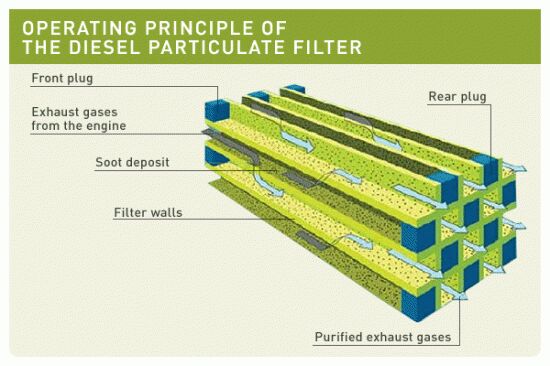TUV Nord Testing Firm: Direct Injected Gasoline Engines Emit More Particulates Than Diesels
TUV Nord, a safety testing and certification agency, has issued a report commissioned by an environmental group that says that modern engines that use gasoline direct injection (GDI) of fuel emit more small particles in their exhausts than modern diesel engines. Particulates raise concerns over possibly causing cancer. GDI has proliferated as a means of increasing power, improving fuel efficiency and lowering CO2 emmissions but TUV Nord says that GDI engines put out 1,000 times more harmful particles than traditional gasoline engines and 10 times more than the latest diesels. The study is based on a sample size of three cars, a Ford Focus with a 1 liter EcoBoost engine, a Renault Megane with a 1.2 liter Energy TCe, and a Hyundai i40 with a 1.6 liter GDI engine.
“The cost of a filter to eliminate particle emissions from GDI cars is low (around EUR50 [~$68 US]), with no loss in fuel efficiency and a big societal benefit. Despite this, carmakers are delaying fitting filters on GDI cars,” the Transport & Environment advocacy group based in Brussels said in a summary of the report.
Greg Archer, clean vehicles manager at Transport & Environment, said, “Cars are the largest source of air pollution in Europe’s cities and 90% of European citizens are already exposed to harmful levels of particle pollution. Carmakers’ reluctance to install cheap particle filters on GDI engines means that society as a whole has to pay the cost through more ill health.”
EU laws currently require particulate filters to be fitted to all new diesel cars but there is no requirement for gasoline powered cars. All of the cars tested by TUV Nord showed particulate emissions from GDI engines exceeding the 2017 European emissions limits, Euro 6. Fitting particulate filters reduced the number of particles in the exhaust by a factor of ~2,000, with results similar to those found in unpolluted air.
“More fuel-efficient, lower CO2 GDI engines would be a great innovation if they did not emit harmful particles. These particles can be eliminated for the price of a hands free kit. It’s time for carmakers to act responsibly and make petrol cars less polluting overall,” Archer said.
More by TTAC Staff
Latest Car Reviews
Read moreLatest Product Reviews
Read moreRecent Comments
- Kwik_Shift_Pro4X Union fees and corruption. What can go wrong?
- Lou_BC How about one of those 2 foot wide horizontal speedometers out of the late 60's Ford Galaxie?
- Lou_BC Was he at GM for 47 years or an engineer for 47 years?
- Ajla The VW vote that was held today heavily favored unionization (75/25). That's a very large victory for the UAW considering such a vote has failed two other times this decade at that plant.
- The Oracle Just advertise ICE vehicles by range instead of MPG and let the market decide.


































Comments
Join the conversation
Do Gas direct injection engines control combustion temperature with exhaust recirculation like port injected engines? As far as I know, the combustion temperatures are no higher in a GDI engine than in a port injected engine. GDI engines generally have a higher compression ratio than port injected engines. This allows cramming in more fuel and air per stroke, but would not necessarily result in higher combustion temperature.
But think about the similarity between diesels and GDI engines: The fuel is injected into highly compressed, hot air just before ignition; with the port injected engine fuel is essentially "mixed" with cool, low pressure air on the intake stroke. These differences are likely enough to cause aggregation of some compounds into non-flammable (or poorly burned) particulates. Disturbing that this was never revealed.